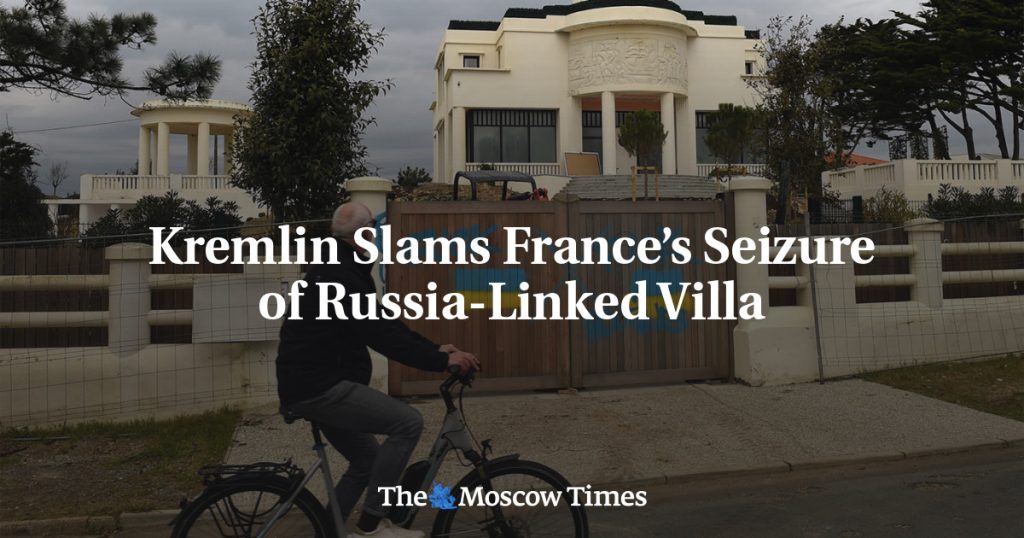The Kremlin has condemned the seizure of a villa in France allegedly belonging to Russian businessman Artur Ocheretny, who is the new partner of President Vladimir Putin’s ex-wife. The property located in Anglet was seized in December 2023 as part of an investigation into money laundering. Kremlin spokesman Dmitry Peskov criticized the seizure, stating that any encroachment on private property is illegal and undermines the foundations of the legal system in France. The luxurious art deco home, nicknamed “Suzanna,” was purchased for 5.4 million euros in 2013, with renovations costing up to 3.5 million euros. The investigation is based on a complaint by NGO Transparency International, which tracks assets linked to “dirty money.” While no formal charges have been made, investigators are looking into the source of the funds used to purchase the villa.
Following Russia’s invasion of Ukraine in February 2022, numerous Russian assets have been frozen or confiscated in Europe due to sanctions imposed by Western countries. The Kremlin has responded angrily to these actions, calling them an unprecedented violation of international law. The European efforts to use seized assets to arm Ukraine have further exacerbated tensions between Russia and Western nations. The fallout from the Ukraine conflict has led to increased scrutiny over the financial dealings of Russian individuals and the potential use of illicit funds to purchase assets abroad. The seizure of Ocheretny’s villa is part of a broader crackdown on suspected money laundering activities linked to Russian individuals.
The investigation into Ocheretny’s villa has raised questions about the origins of the funds used to purchase the property and the possibility of fraudulently obtained money being laundered through real estate transactions. While prosecutors have not formally charged anyone in connection with the case, the probe reflects a growing concern over the illicit financial activities of wealthy Russian individuals in Europe. The involvement of Transparency International in bringing attention to the issue underscores the importance of civil society organizations in holding individuals and governments accountable for financial misconduct. The seizure of the villa serves as a warning to individuals engaged in money laundering that their assets may be subject to investigation and confiscation.
The Kremlin’s strong response to the seizure of Ocheretny’s villa reflects Russia’s broader condemnation of the sanctions and asset freezes imposed by European countries in response to the Ukraine conflict. The Kremlin views these actions as a violation of international law and an unjustifiable attack on the rights of Russian citizens to own property abroad. Moscow has criticized European governments for using seized assets to support Ukraine militarily, arguing that such measures are counterproductive and escalate tensions in the region. The standoff over the villa serves as a microcosm of the larger geopolitical conflict between Russia and Western countries.
The dispute over the villa in France highlights the challenges of enforcing international laws and regulations regarding money laundering and illicit financial activities. The investigation into Ocheretny’s property underscores the importance of cross-border cooperation in combating financial crimes and holding individuals accountable for their actions. The involvement of civil society organizations like Transparency International demonstrates the role that non-governmental actors play in monitoring and exposing financial misconduct. The seizure of the villa sends a strong signal that individuals engaged in illicit financial activities will face consequences for their actions, regardless of their status or connections.
In conclusion, the seizure of Ocheretny’s villa in France represents a significant development in the ongoing efforts to combat money laundering and illicit financial activities linked to Russian individuals. The probe into the source of funds used to purchase the property underscores the importance of holding individuals accountable for their financial dealings and ensuring that assets are not acquired through fraudulent means. The Kremlin’s condemnation of the seizure reflects the broader tensions between Russia and Western countries in the wake of the Ukraine conflict. The standoff over the villa serves as a symbol of the larger geopolitical struggle over sanctions, asset freezes, and international law. Ultimately, the case highlights the importance of transparency, accountability, and cross-border cooperation in addressing financial crimes and protecting the integrity of the global financial system.


